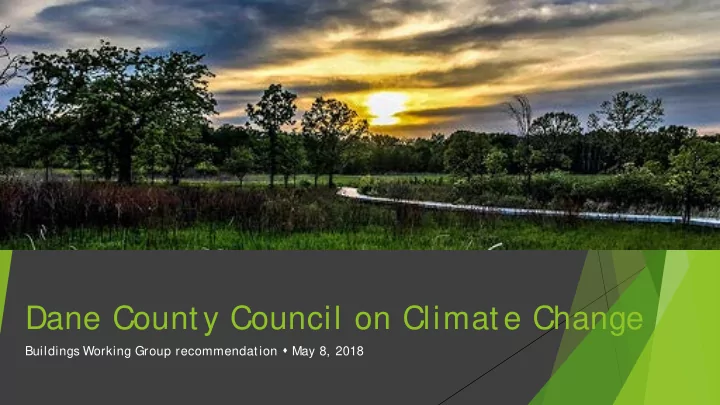

Dane County Council on Climate Change Buildings Working Group recommendation May 8, 2018
Dane County OECC Buildings Working Group National talent – local commitment to place Technical rigor Market alignment Deeply pragmatic – “ art of the possible”
Approach Economic benefits Health Justice & equity Bridging the rural/ urban divide Energy security & resilience
Framing & key themes “ at the local Voluntary, not S trong sense of level, you can Leadership mandatory place & place- still get stuff making done” Re-engage with Thriving Connection to Diversity & conservatives economy the environment inclusion Momentum Opportunity
Why buildings? S ource: EIA, Archit ect ure 2030
Why buildings?
Why buildings? We spend 87% of our time indoors S ource: Lawrence Berkeley Labs, Nat ional Human Act ivit y Pat t ern S t udy
Why buildings?
Why buildings? Immediate cost savings – energy bills Energy retrofits average 10-20% return on investment “ I want my business to be in a building that reflects my company’s values.” Buildings j obs: 100% local
Buildings & climate leadership: a catch-up opportunity for Dane County
Building energy codes S ource: DOE
Building energy codes S ource: DOE
Benchmarking & transparency policies
2030 districts 50% reduction in building energy, water, & transportation emissions by 2030
ACEEE rankings in energy efficiency
Recommendations for the Council
1: Voluntary performance challenge Outcome-based: Based on how a building performs with people in it, not on how it’s designed. S imple: pick a level, do energy-savings proj ects that you choose, watch usage go down. All can participate. Choose the level that’s right for you: Climat e hero – net zero or net posit ive, definit ion TBD S uper high performance – 75% bet t er t han peer buildings High performance – 50% bet t er t han peer buildings Bet t er building – 25% bet t er t han peer buildings (exist ing only)
2. Lead by example: Better Buildings Challenge Leading businesses, manufacturers, cities, states, universities, and school districts, commit to improving the energy efficiency of their portfolio of buildings by at least 20% over 10 years and share their strategies and results.
3. Target under-performers, voluntary performance tracking Collaborate with utilities & Focus on Energy to identify abnormally high energy usage by building type, target with extra assistance. Encourage, support and assist owners in tracking energy use to help owners understand their energy use
4. Benchmarking policy support for municipalities S hare best practices Model policy language when requested
• S ignificant ROI from energy investments Economic benefits • Climate leadership attracts new business • Business can better manage their buildings • Improved indoor environmental quality Health • Lower emissions / better air quality • More productive places to work and learn Benefits to • Programs on-ramps for all Justice & equity • Targeting Dane County Bridging the • Targeting rural/ urban divide • Allows small municipalities to lead by example Energy security & • Improved building stock resilience • Distributed resources
Marge Anderson manderson@ seventhwave.org
Recommend
More recommend